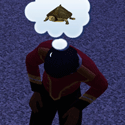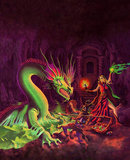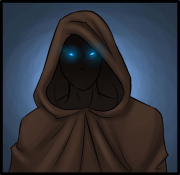|
Rigged Death Trap posted:IMO tho where talents would really change the path of history is in insurgencies and in asymmetric, guerilla warfare. Vietnam, indochina, korea, Iraq/Afghanistan, civil uprisings and revolutions. Those kind of settings. This is a big theme in Progenitor, another Wild Talents-based game that's much looser about supers affecting history. In fact the Troubles are one of the recurring threads in that setting's history, as (if the PCs do nothing to stop it) the IRA is saddled with a self-appointed super team that's just a bunch of murderous assholes who only escalate the violence.
|
|
|
|

|
| # ? Apr 23, 2024 11:50 |
|
Wild Talents (and maybe Godlike too, not sure yet) contains a section about outlining your own superhuman alternate history, and one of the parameters is basically Historical Inertia, where you describe how much of an impact the existence of superhumans have on major historical events. By that metric, Godlike has very high interia-- Talents affect historical events, but don't actually alter them very far off from how they really occurred.
|
|
|
Strange Matter posted:Wild Talents (and maybe Godlike too, not sure yet) contains a section about outlining your own superhuman alternate history, and one of the parameters is basically Historical Inertia, where you describe how much of an impact the existence of superhumans have on major historical events. By that metric, Godlike has very high interia-- Talents affect historical events, but don't actually alter them very far off from how they really occurred. Here's something that's kind of hosed up: The emergence of Talents could potentially be taken as a vindication by fascist groups of their ideology even if they themselves end up getting blutched by minorities with Stands. After all, do not these things emerge from the stress and shock of war?! But if I recall, Talents can emerge from more conventional stressful/shocking incidents, it's just that military action is unusually efficient at delivering that stress and shock to large numbers of people at once. Mors Rattus posted:Like, I legitimately find it insulting that we have established that Talents are caused by stress and there isn't one rebelling Jewish Talent, the Holocaust hasn't changed at all. 
|
|
|
|
|
Nessus posted:Here's something that's kind of hosed up: The emergence of Talents could potentially be taken as a vindication by fascist groups of their ideology even if they themselves end up getting blutched by minorities with Stands. After all, do not these things emerge from the stress and shock of war?! https://www.youtube.com/watch?v=RXlmjL3JU4M
|
|
|
|
I was OK with the Hyperbrains not massively altering the course of the war, but that was the writers' sole "get out of side-effects free" card and they played it. The writers shouldn't have finished the entire timeline, I feel. If they'd paused it at that glorious superpowered D-day (very much the setting's high point, with the later "Nazi stay-behind Talents plotting in the Paris underground" one as a solid second place) and let the players take over, then pretty much every problem goes away. Then they could let the PCs alter history as they see fit. At some point I may do a writeup of a very fun little alt-hist game called Hard Vacuum, which is explicitly WW2 But Also In Space and it does handle timeline divergence well, starting with transorbital reconnaissance in Pacific naval battles. Loxbourne fucked around with this message at 21:29 on Mar 21, 2017 |
|
|
|
Or gone over the timeline, but had little bits with "And here's how your players can change things!"
|
|
|
|
I really should have mentioned it, it's a very forest-for-the-trees thing, that the reason the timeline follows the normal events of the war is so that your gaming group can insert itself at any point along the way and totally gently caress up history Inglorious Basterds style. Replace Hugo Stieglitz and the Bear Jew with L'Invocateur and the Warsaw Golem.Loxbourne posted:The writers shouldn't have finished the entire timeline, I feel. If they'd paused it at that glorious superpowered D-day (very much the setting's high point, with the later "Nazi stay-behind Talents plotting in the Paris underground" one as a solid second place) and let the players take over, then pretty much every problem goes away. Then they could let
|
|
|
Halloween Jack posted:FINALLY it's my turn to post the aniems
|
|
|
|
|
MightyMatilda posted:...You're not reviewing an index book, are you? Because that sounds rather pointless. That does sound ridiculous, doesn't it? 
|
|
|
|
OK. I've read the whole thread over the course of the last few weeks. It's quite the thread! Torg is definitely a thing. There's some great stuff out there too, like Reign. I'm quite taken with Reign, and would love to run a campaign within the default setting. Are there any pre-written adventures out there for me to get my feet wet with? My googling has been ineffective.
|
|
|
|
Godlike really should have been called Known Armies.
|
|
|
|
|
Subjunctive posted:OK. I've read the whole thread over the course of the last few weeks. It's quite the thread! Torg is definitely a thing. There's some great stuff out there too, like Reign. The supplements for REIGN are free on Stolze's sight, last I checked, and one of the sections in The First Book of Reign is a chapter on campaign seeds, at least, because Stolze was tired of being asked "But what do I do with it?"
|
|
|
|
Subjunctive posted:OK. I've read the whole thread over the course of the last few weeks. It's quite the thread! Torg is definitely a thing. There's some great stuff out there too, like Reign. Reign's a fantastic setting and I hope one day someone can cover all the fluff for it for everyone's enjoyment. Halloween Jack is right that Greg Stolze's website is about the best resource you'll find for it. You can also randomly generate characters and see what plot hooks come out of that.
|
|
|
|
Loxbourne posted:I was OK with the Hyperbrains not massively altering the course of the war, but that was the writers' sole "get out of side-effects free" card and they played it. I dunno, personally I like Godlike's prevailing motif of a typical man with a gun being an equal match for a typical man with a Talent. Every time Godlike has mentioned big Talent fights, the Allies tend to win because they don't neglect non-Talented weapons, tactics, and allies rather than going for a straight contest of superpowers like the Germans do. If I were to run Godlike, I'd probably run with the idea that most Talents lived and died the same way their mundane counterparts did and there's only a rare few who were capable of really changing things, that this is an era in which technology has mostly caught up with superpowers.
|
|
|
|
One of big German Talent's powers were "he's really good at fighting with guns." Your Talent might might be as powerful as a bazooka, but it's WW2 and those things are everywhere.
|
|
|
|
wiegieman posted:One of big German Talent's powers were "he's really good at fighting with guns." Your Talent might might be as powerful as a bazooka, but it's WW2 and those things are everywhere. TBF, I'd rather have "really good at fighting with mortars and indirect weapons" myself.Be like the Roach from Apocalypse Now and hit dudes perfectly by supernaturally sensing them, even if they're hiding under a pile of dead Viet Cong bodies.
|
|
|
|
Cythereal posted:I dunno, personally I like Godlike's prevailing motif of a typical man with a gun being an equal match for a typical man with a Talent. Every time Godlike has mentioned big Talent fights, the Allies tend to win because they don't neglect non-Talented weapons, tactics, and allies rather than going for a straight contest of superpowers like the Germans do.
|
|
|
|
Halloween Jack posted:The supplements for REIGN are free on Stolze's sight, last I checked, and one of the sections in The First Book of Reign is a chapter on campaign seeds, at least, because Stolze was tired of being asked "But what do I do with it?" Yeah, I've read (devoured) the supplements. I'm looking for stuff about things like encounter balancing and rest pacing and difficulties/penalties, maybe examples of the early stages of building up a Company. I was hoping to be able to spend my energy guiding players and myself through the mechanics and setting, and lean on someone else for balancing/pacing. Lazy, you might reasonably say, but I'm deeply out of GM practice and don't want to build out a whole thing myself if the mechanics or setting aren't going to stick with my group. Nonetheless, I'll revisit the seeds! Thanks. E: hmm, I can find the setting colour (Ob-lobs and 7 cities), but nothing that feels like campaign seeds upon revisiting. What did you have in mind? E2: Second Year of our Reign has it! Subjunctive fucked around with this message at 11:37 on Mar 22, 2017 |
|
|
|
I still think of the Alexander the Great cartoon whenever someone talks about REIGN.
|
|
|
|
Terrible Opinions posted:See that's part of what makes me still find the Holocaust part problematic. If you gave a bunch of Holocaust victims guns without their captures' knowledge I think there would have been significantly more successful concentration camp rebellions and mass escapes. I find the Holocaust problematic in general for a WW2 game (and also Unit 731 and all sorts of other horrible atrocities). If you're in a game where these things matter in all their horror, you're probably not in a game where you're worrying overly much about Talents - easy enough to say no you can't teleport guns into Auschwitz there's a German Talent who blocks it. I could see something like The New Order where a group of Talents intentionally gets themselves sent to a death camp and then use their powers to stage a rebellion and mass escape, though.
|
|
|
|
If you are going to discuss nazis without bringing up the horrible poo poo they did, that's kind of really weird? And then going and saying that the universe blocks all attempts for their victims - and only those, no one else - to get superpowers and fight is...even weirder?
|
|
|
|
wiegieman posted:One of big German Talent's powers were "he's really good at fighting with guns." Your Talent might might be as powerful as a bazooka, but it's WW2 and those things are everywhere. Young Freud posted:TBF, I'd rather have "really good at fighting with mortars and indirect weapons" myself.Be like the Roach from Apocalypse Now and hit dudes perfectly by supernaturally sensing them, even if they're hiding under a pile of dead Viet Cong bodies. If you just want to powergame combat, Hyperstats in Coordination, Sense, and Will are probably the way to go. Only problem is that you'll need something like a mortar to hurt guys who are just plain bulletproof. Halloween Jack fucked around with this message at 14:29 on Mar 22, 2017 |
|
|
|
It sounds like godlike commits the usual war nerd sin of only wanting to focus on the sexy, fun parts of the war.
|
|
|
|
Nessus posted:I preferred the abridged version. "Chentlemen...! We....! are Nazis...!!!!" Incidentally if you haven't seen it. Even a non-anime fan like myself can strongly recommend Hellsing Ultimate Abridged. https://www.youtube.com/watch?v=TgnIjJexut4&list=PLADA20FD34120A912 'Get down on your knees!' 'I'm not your mother last night.' Deptfordx fucked around with this message at 14:27 on Mar 22, 2017 |
|
|
|
So it turns out that Warren Ellis is writing a comic series, The Injection, about how a think tank basically invented the God Machine.
|
|
|
|
The characters would probably fit nicely into a chronicle, too.
|
|
|
|
Halloween Jack posted:So it turns out that Warren Ellis is writing a comic series, The Injection, about how a think tank basically invented the God Machine. That's a good fit. Like the God Machine, Ellis operates on a cosmic time scale incomprehensible to regular humans.
|
|
|
|
Nuns with Guns posted:That's a good fit. Like the God Machine, Ellis operates on a cosmic time scale incomprehensible to regular humans. 
|
|
|
|
Halloween Jack posted:So it turns out that Warren Ellis is writing a comic series, The Injection, about how a think tank basically invented the God Machine. Would it be similar to Issac Asimov's story about how a computer asked the question "how do we reverse entropy" responds with "let there be light"?
|
|
|
|
No, more like this:
|
|
|
Mors Rattus posted:If you are going to discuss nazis without bringing up the horrible poo poo they did, that's kind of really weird? Their goal was probably "a more realistic look at Golden Age superhero antics, like Captain America and poo poo" and they built from there. Thinking about it you also get a double bind situation here that doesn't exist quite so hard in most historical/AU settings. Say that due to uprisings, a shortage of Talents, and the pressures of the Eastern Front, ol' Adolf decides they should put off most of the extermination until they've secured the East. Hitler still loses -- but now the Wannsee Conference joins the Morgenthau Plan in "6 Totally hosed Plans for Post-War Europe" and in a very real sense the Nazis have stopped being that historical moment we call, Nazis. This is a fine outcome if it happened because of your PC actions, directly (you blow up the Wannsee Conference) or indirectly (the Stardust Crusaders roll back Germany months ahead of schedule). If they wrote it in the book's core timeline, it would be pretty hosed up.
|
|
|
|
|
Halloween Jack posted:No, more like this: So that's how AM did it...
|
|
|
|
 Chapter 5: The Paranormal The first of the two "GM's Eyes Only" chapters at the end of the core rulebook, chapter 5 gives an introductory look at the world of the supernatural in Conspiracy X, with a brief statement at the start that those who want deeper insight should go look at The Paranormal Sourcebook (which would be six years away at the time of its original printing, but oh well, details!). This is where all the stuff about psychic powers, magic rituals, and anything else Fortean that isn't directly technology- or extraterrestrial-based goes.  Psychic Abilities Psychic abilities, or psi, are a manifestation of the human consciousness wherein the mind can sense and affect reality. In spite of how much research has gone into psi through the parasychologists of MKULTRA, Project Rasputin, and Aegis, it is still unknown just how the process works on a hard science level. Research suggests that nearly 95 to 99 percent of humans can utilize psychic powers, which is an insanely high number when you think about how big the population of Earth is. Of course, as noted back in chapter 2, the overwhelming majority of individuals merely have the Basic ESP quality, rather than being what are known as proper psychics. These sorts of psychic manifestations are what lead to "gut feelings" and the like that all non-damaged ("damaged" in this case being someone who is either a Psychic Burnout, Psink, or Void) humans have, divided into five specific powers in the Basic ESP quality. Characters can only use a specific one of these five powers once per week, and success requires either a Difficult Willpower Test. All five of them let you get an answer to a simple yes-or-no question about one thing in particular: Hunch for present events, Intuition for someone's intended thoughts about their course of action for the next hour, Ken for past events, Read Aura for someone's emotional state and vital signs, and Second Sight for future events. Full-fledged psychics have access to greater powers, which they can buy with character points. Each psychic power has two stats to it for a character: Strength is how much raw oomph you can put into the power, while Art is basically just the skill level equivalent. This means that, depending on how you wish to allocate your points, you could have someone who has a bit of a hard time landing their psychic power but can break reality over their knee when they do, someone with very little punch to their powers but an almost unerring ability to activate them, or something in between. While most of the fun powers like mind control and pyrokinesis are over in The Paranormal Sourcebook, three psychic powers are provided in the Conspiracy X Second Edition core rulebook itself. The first power, Clairyovance, is like like Hunch on steroids; indeed, once you have any points put into Clairvoyance, any uses of Hunch that the GM accepts are automatically successful without need for a roll. Clairvoyants can see place, people, and events from afar, as well as look inside locked objects, or even act as an early warning system by psychically detecting nearby threats. You go from having brief flashes of events happening a few yards away to detailed long-term visions several miles away as you head up its Strength track. Telekinesis, also known as psychokinesis, is primarily made up of moving and throwing objects remotely. You can also use it to buff your physical strength and melee attacks, land ranged invisible punches, parry attacks other than bullets, and create force fields. The Strength of your Telekinesis gains further lifting capacity and damage capabilities at the same rate as the Strength attribute. Finally, there's Telepathy. You know the drill: you can talk to people through their mind, and they can talk back. It can also block others' attempts to poke into the psychic's own mind, and at Strength 4 or more you can burn a point of Essence to "psychic scream" inside someone's mind and briefly overload their senses. Like Clairvoyance, the range of Telekinesis is boosted with greater Strength, starting out needing to actually touch someone to access their thoughts and ending with dozens of miles of reception. It's worth noting here that there's a sidebar in this section on eschewing normal rolls for Basic ESP and psychic powers, instead using a Rhine Test. This is a reference to an actual set of experiments regarding ESP conducted by parapsychologist J.B. Rhine and psychologist Karl Zener in the 1930s utilizing "Zener cards", a deck of cards depicting either a circle, a cross, waves, a square, or a five-pointed star. With this optional rule, rather than making any normal die rolls, you print out a set of Zener cards provided by the book and ask the player to guess the correct symbol of a card they are about to draw in order to use their character's psychic power. Weird? Perhaps, but it's certainly interesting as well.  Seepage While Aegis was created to combat the extraterrestrial menace, its ancestor was a conspiracy known as the Watch, which investigated and fought against the strange occult things of this world. While those concerns may have taken a back seat to aliens, they are nonetheless ever-present, and knowledge is power. One of the biggest sources of knowledge Aegis has gained was the 400 page occult manuscript known as the Queens Tome, written sometime during the 1950s and uncovered in Queens, New York, in 1983. It spoke of various visions of madness and chaos, but most importantly it laid out an understanding of what is now known as Seepage. Seepage is the psychic runoff of the entire human species, bound to the planet as a great "world-mind", a sort of collective unconscious. Seepage is constantly fed by the dissipating energies of the human aura and its favored meal of the psychic trauma let out by fear and anxiety. The more stressed and afraid people are, the more heartily Seepage gets fed, and the more powerful it gets. When enough energy comes into a single area over a duration of time, Seepage is capable of acting as a sentient and malevolent force, using the superstitions and fears of the people in the area to build manifestations of their beliefs to keep the cycle of fear energy flowing. Ambient Seepage first gathers in one place as a Pool. Temples and churches, haunted houses, crime scenes, battlefields, and other areas with strong emotional impact are where Pools crop up and the aforementioned sentient part of Seepage awakens. Feed it enough psychic energy that it becomes extremely famous the world over and the Pool evolves further into a Locus (as in genius locus, the Grecian "spirit of place"). The Bermuda Triangle? That's a Locus. Stonehenge? Yep. The Pyramids of Giza, Tenochtitlan, Easter Island, Vatican City, and Jerusalem are also well-known Loci. The main mechanical effect of the strength of Seepage is the Seepage Points system. SP is what fuels both guided magic and the random Fortean phenomena that pop from Seepage from time to time. ambient Seepage or an undisturbed Pool has 1 to 10 SP, an "agitated" (strengthened by recent traumatic events or heavy ritual use) Pool or average Locus has 5 to 50, and an agitated Locus has 30 to 100. This gets boosted during certain events: +5 at noon or midnight, +5 during the day before, during, or after a full moon, +20 during a solstice or equinox, and +30 during the Gaelic sacred days of Imbolc, Beltane, Lughnasadh, and Samhain. Furthermore, each Supernatural Focus on the scene boosts the SP by twice their Willpower, while each Psink present reduces it by that same amount. Lost SP is regained each midnight.  Rituals Magic in the world of Conspiracy X is effectively codified Seepage manipulation. Long, complicated rituals are utilized to draw its power out and shape it as the ritualist wishes. All rituals are effectively their own skill, being bought up and mostly rolled as any other skill would be, and you can even cast one as an Unskilled Task if you have the instructions of the ritual handy and are either really desperate or really stupid. There are a few differences between Ritual Tasks and other skill rolls, however. First off, you've got to have enough SP to actually cast the ritual in the first place, otherwise the Ritual Task just fails then and there. You can get d4 free SP for each level of success on the Outcome chart you manage with your Ritual Task, but it's not really a reliable enough source of extra juice to lean on it too heavily. Second, having enough Seepage to fuel the ritual but still loving up your roll means you have to make a Difficult Willpower Test to avoid gaining a stage of Corruption. And, if you recall, Corruption is very much a not-good thing. Five rituals are presented in Conspiracy X Second Edition, with a small paragraph giving some basic rules for gauging the strength of your own homebrew rituals and even more rituals being found in The Paranormal Sourcebook. Three of these rituals are all related to spirits, a type of manifested being of Seepage: Banish Spirit lets you take d4 hours to disperse a spirit back into its primal energy, Bind Spirit is a half-hour ritual to bind a minor spirit to your will for a whole day (this gets an optional free banishing by commanding the spirit to depart), and Summon Spirit is a three hour ritual to call forth a new spirit or reform a banished one. The Ritual to Cure Corruption is a two hour ritual to purify someone of the Corruption that has taken hold of their body. It is an especially risky ritual, as success or failure deals d6 x 2 Life Points from strain, the subject failing a Simple Willpower Test after the spell has been successfully cast can render them a Void or a Psink, and a failure of the spell after SP has been gathered means both the normal risk of Corruption for the caster and an immediate Test to see if the target snaps then and there. Talk about your risk and reward solutions. Finally, a Warding Circle is the quickest ritual at only five minutes to complete, and lets you forge a magic circle or square that keeps spirits and Infused from crossing it, be they inside or outside of its radius. A Warding Circle lasts for up to a day, though any breakage of the physical markings that denote its limits will immediately end the effects. While the entity cannot break the circle on its own, it can attempt to influence those who can. Manifestations These are random supernatural events caused by Seepage. Some types of manifestations include cold spots, disembodied voices or other strange sounds, sudden feelings of melancholy, shadowy figures or phantasmal images, crop circles, ball lightning, ectoplasm, and spontaneous psychic power usage. There's only a few vague paragraphs on the subject here, with a far more in-depth look at paranormal phenomena associated with Seepage manifestations in...well, you can probably guess by now.  Corruption As one slides into embrace of Seepage, they become corrupted by dark influence. There are six stages of Corruption, each granting a drawback or (more rarely) quality related to the path the individual is being taken down. This, like many things in this chapter, is kept on a strict "GM should do it" level, with actual hard-coded "you get this drawback at this stage for this archetype" rules being in you-know-where. Corruption mainly occurs from failed rituals, but spirit possessions, intentionally corrupting rituals, and various other "rarely subtle" Bad Things of the Seepage. Every time the corrupted individual gains another stage of Corruption, they have to make a Simple Willpower Test penalized by how many stages of corruption they have reached, failure meaning that they snap. After snapping, they have to make a Difficult Willpower Test, with failure meaning they become the Forsaken and success making them Infused. Supernatural Foci always become Infused if they snap. Snapping replaces the Forsaken or Infused's Essence stat with their own personal Seepage Pool of the same amount, which they can use alongside the ambient Seepage around them to fuel Infused powers (things like supernatural regeneration, the creation of mind-slaved thralls, and illusions) or rituals. One thing that is made abundantly clear by the text is that corruption doesn't form species or anything of the like. Instead, each corruption always spread the same Archetype. Archetypes can be any sort of cultural standard, from Carl Jung's archetypes and concept of personas to religious figures to symbols of the Tarot. Being bitten by a vampire, for instance, doesn't necessarily mean you are going to become a vampire: a vampire is an avatar of the Predator, but so are werewolves, wendigos, and slasher movie villains, and its corruption could manifest along any of those paths. Forsaken are unfortunate enough to know that they are supposed to fit their Archetype but have no physical changes or Infused powers to back up what their brains are telling them, so they are complete and total messes. Of course, in spite of actually getting the whole body transformation part of the deal, the Infused don't fare much better. Conspiracy X takes a "the mind is the plaything of the body" approach to metamorphosis, and even Infused that snap early enough that they only get one or two drawbacks will almost always eventually succumb to fitting into the monster-shaped box they have been put in. Spirits Spirits are the after-images of the dead; the actual person's soul, if souls even exist, and consciousness most certainly aren't present. Most spirits are either weak snapshots that repeat the same traumatic experience that led to their death over and over again or barely sapient and incapable of forming long-term memories. There are more powerful sorts, such as demons (Infused spirits that have created the legends of things such as angels, devils, and dragons) or ascended ghosts (particularly powerful possessing spirits), but we won't meet them until The Paranormal Sourcebook. For the meantime, we have regular old ghosts, which effectively have the same stats as a normal human save for the ability to do anything physical rather than mental, which has been traded for access to Infused powers and Seepage manifestations. For unknown reasons, almost all spirits dissipate within a few decades to a few centuries, with truly ancient ghosts being extremely few and far between. Next Time: We enter the final chapter, wherein the deepest secrets that aren't in some other sourcebook are revealed. Meet the three extraterrestrial species, learn the Mostly True History of America, and more in Chapter 6: Classified. Fossilized Rappy fucked around with this message at 02:55 on Mar 23, 2017 |
|
|
|
I really enjoy Seepage quite a bit because while it's heavily connected to all of the alien shenanigans, it keeps getting ignored in favor of said alien shenanigans despite being probably the bigger immediate threat. The aliens can be planned for or dealt with. Seepage can't. Seepage is the mind goo from Ghostbusters 2 except we're all secretly drowning in it, it's smothering every single inch of the planet and our fears are responsible for vampires, werewolves and Bigfoot. It manifests in so many chaotic and random ways and doesn't fit in any neat boxes that people just deal with the more concrete parts of it (psychic powers) and ignore the rest. Which is a problem and I love that it's a problem.
|
|
|
|
Seepage is what you get from eating the Olestra tater chips, tho.
|
|
|
|
It's that old joke about how the aliens in X-Files shouldn't be able to invade Earth because there are hundreds of Monster of the Weeks running around.
|
|
|
|
|
Hostile V posted:I really enjoy Seepage quite a bit because while it's heavily connected to all of the alien shenanigans, it keeps getting ignored in favor of said alien shenanigans despite being probably the bigger immediate threat. The aliens can be planned for or dealt with. Seepage can't. Seepage is the mind goo from Ghostbusters 2 except we're all secretly drowning in it, it's smothering every single inch of the planet and our fears are responsible for vampires, werewolves and Bigfoot. It manifests in so many chaotic and random ways and doesn't fit in any neat boxes that people just deal with the more concrete parts of it (psychic powers) and ignore the rest. Bigfoot do exist and they're not humans corrupted by seepage. That's assuming I'm remembering the magic splat and the Atlantean splat correctly.
|
|
|
|
Tasoth posted:Bigfoot do exist and they're not humans corrupted by seepage. That's assuming I'm remembering the magic splat and the Atlantean splat correctly. Werewolves and Draculas and Victor Frankensteins then.
|
|
|
|
 Aethera Campaign Setting Part Two - Races & Classes The full Aethera campaign setting has been released, and Kickstarter backers have recieved PDF copies. Thus, I shall now begin relaying its contents to you, and I will soon no longer need to mentally subtract a significant amount from my bank statements when determining how much money I have. The book begins, after the standard legal frontispiece and writing/art credits, with a three-page list of Kickstarter backers. And hey, there's my name, right there on the first page, pretty close to the top. For about a decade or so now, I've had this urge to make some impact on the world. And now, having backed a Kickstarter that may very well have failed without my support and seeing my name in the book, a permanent feature of some nerd's library, that feels like I've had an impact. I mean, considering how much attention I pay to the list of backers in any other thing, no one's going to notice that I was instrumental in it or anything like that, but it feels good anyway. Masturbatory self-congratulations aside, we move into a small discussion of the origins of the setting. In 2006, Robert Brookes and co-creator Jacob Thomas were coming off a years-long session in a homebrew setting inspired by martial arts and wuxia (Which I have also played) and wanted something different. "While many of the names from our original concept changed, the backbone of what would become Aethera surfaced from a desire to move in a direction so far from traditional fantasy that every character, every creature, and every adventure would feel fresh and new." They worked on it for a while until the release of the Pathfinder Alpha Test made them decide to shelve the idea for a bit until Pathfinder was fully released, and wound up forgetting about it. It's worth noting that this is almost what happened during the kickstarter, because the announcement of Starfinder, a full-on space opera system based on Pathfinder, was announced, and they delayed development until they could get more info on it and decide whether or not to release Aethera for Starfinder instead. Eventually, Robert found the notes on an old hard drive and began working in earnest, assembling a team and freelancers, culminating in not only the book that I will soon hold in my very hands, but several adventures and a splatbook to follow hot on the heels of the core campaign setting. Which you will also be getting reviews of, because he's also sending those to backers as apology for the long delays. Chapter One: Races Each chapter begins with a two-page comic spread. Chapter One's involves a man and a robot talking in a dim, noir-esque detective's office. The robot is Hauyne, one of the setting's iconics: A phalanx Investigator, presenting as female and having had a literal boob job to do so. She and the unidentified man are speaking about some hero of the war, who had some pretty vital intelligence and was on a ship that got captured by a race known as the Taur. We don't know anything about them yet, but by inference, they're bad news, and probably space minotaurs, because the term "labyrinth-ship" is used. The comic ends with Hauyne declaring she's going to call in some favors in her investigation as the panel shows four dossiers on her desk, each showing the face of another of the iconics: Arakhu, okanta cavalier; Kasara, human aether soldier; Oemathra, erahthi alchemist; and Surestra, infused brawler. Most of the content on races in Aethera was covered in my coverage of the Early Access Guide. We do get a page on the origins of some of the less-common races. Elemental planetouched- ifrit, oread, sylph, and undine- are the random result of exposure to various elemental radiations, and appear in all the common races (Except phalanx and erahthi - they don't reproduce sexually), but far more commonly in humans. We're told that zahajin- whatever they are- only produce undine and a very rare ifrit, while the taur either produce no elemental planetouched or butcher them immediately upon birth for the sake of racial purity, no one really knows. Dhampir, on the other hand, are both the result of vampire attacks and of sub-fatal aetherite exposure in one or both parents or an in utero exposure that results in the fetus briefly dying and reanimating. We do get more detail on the politics of the various races. It's not unheard of for erahthi out in the system to hold faith with Scorism, a group known as the Riders openly opposes the human Hierarchy with guerilla radio, the Hierarchy uses a societal placement program known as the Slotting program to fill gaps left by war casualties, the Paragon Ascendancy on Orbis Aurea hires and promotes a large number of Infused, and okanta use certain surface-level aetherite sites on Orbis Aurea as holy pilgrimage sites and have thus deemed them off-limits to mining operations. There are also more favored class options than those provided in the preview guide. For instance, Infused make good sorcerors, gaining a free spell with the [Force] descriptor every level. The less common races are covered in more detail, including local names for themselves, what sort of societal reception they get, and a few tantalizing mentions of exceptions to their general rarity. Chapter Two: Classes This chapter's comic is Oemathra, the erahthi alchemist, testing a phytoregenesis serum on a withered plant. The plant begins to smoke and grow, glowing a menacing red. Oemathra calls for quarantine and slips into a spacesuit as the plant's growth begins to crack the dome they're working in. The plant sprouts toothy, leaf-bordered mouths and breathes fire at Oemathra as they remark the phytoregenesis serum is easily weaponized. They hurl a fruit-like grenade at the plant, wiping it off the face of the moon, and request destruction of all samples of the serum. The classes in Aethera provide more than the standard interaction with the world of hitting things in inventive ways. "Some societies have a higher predilection towards one class than another, or—such as is the case with the human homeworld of Akasaat—fear or prejudice towards some classes." On Akasaat, all magically-capable citizens and certain uncommon races are required to be registered with the Hierarchy or face being hunted down and captured by an elite tracking force. Across the setting, societal roles are heavily tied into one's capability and personal value, and the book recommends thinking of how your character responds to being quantified so thoroughly. The book also recommends playing against type a bit. There's not as many druids in the urban centers and wastelands of Akasaat as on the erahthi homeworld of Kir-Sharaat, so yours would be fairly special. A special note must be made about clerics (and warpriests). The Aethera System has no deities, and outside deities cannot reach or even see the place. There are no supplemental rules or roles for clerics in the setting, and any cleric you work out with your DM will have to be really special. The book supplies the recommendations of someone from outside the system, or a relic of the past tapping into an unknown power source. I covered the Cantor in my first entry, they're spontaneous-casting divine bards, but they have some nice tricks. One of their divine performances (read: "bardic music") grants rerolls, first to the cantor themselves, then later to allies, and still later, forcibly to enemies. They gain various utility powers, called verses, starting at things like at-will Feather Fall upgrading to Levitate and Fly, expanding the rolls that can be affected by their reroll ability, and channeling energy like half a cleric, capping out at Prismatic Spray, Control Weather, and sacrificing their own HP to heal everyone around them. They specialize in an elemental type (called a hymn), much like a wu jen or certain clerics, and these elemental specializations grant them new class skills, spells, verses, and divine performances, and they can be a bit of a day-to-day generalist by practicing a second hymn every day. Each hymn is associated with a plane, and by extension a planet, except for Shadow, which is associated with all the planets, and Void, which is negative energy and associated with spaaace.  It's a very good class, but not being musically-inclined myself, it was a little hard to keep all the terminology straight. It's a very good class, but not being musically-inclined myself, it was a little hard to keep all the terminology straight.Humans, Infused, Okanta, and Phalanx have cantor as favored classes. Humans get more verses, Infused make the performances of the aether and void hymns better, Okanta gain new spells from the dream, shadow, and water hymn spell lists, and phalanx increase the number of rounds they can use divine performance. Barbarians can be found pretty much everywhere. On Akasaat, you have both gangs of raiders on motorcycles and more peaceful tribes that are furious when roused, as well as criminal thugs and disgruntled anarchists in the cities. Okanta barbarians are very common, and commonly adventurers, which feeds the sereotype of okanta as uncivilized. Human barbarians on Orbis Aurea are usually descendants of early human settlers who have gone native and resist attempts by the Paragon Ascendancy to recivilize them. The Amrita Belt has its share as well, either tribes that settled there from early colonization or military bases, or vile cults. The barbarian is rarer on Kir-Sharaat, however: Zahajin tend to become bloodragers instead, and the cosmopolitan lifestyle of the erahthi tends to discourage such levels of rage. Bards were vital to the human war effort on Akasaat. "Backed up by brass bands and broadcast via radio to the soldiers, their inspiring music was a major factor in many of humanity’s victories." Human society places a high importance on music in general, what with the Score being their big religious deal. Today, in the wake of war, there are also rabble-rousing guerilla radio DJs and whistleblowers, informing the populace of the worst the Hierarchy has to offer. Erahthi bards are generally more offensive in nature. The plant-elemental erahthi are immune to most bardic effects, but the humans they fought were susceptible to charms and compulsions. Meanwhile the zahajin have a strong bardic tradition with many of their tribal leaders holding the class. Most okanta are skalds instead of bards, but those that integrate into human society often take the class. In the Amrita Belt, bards are common, traveling about for new stories, performing in jazz clubs (Phalanx jazz clubs Druids are most common among the erahthi, being plants and coming from a world-spanning forest. Akasaat, meanwhile, slightly discriminates against the class. Human Druidic is virtually identical to erahthi Druidic, and thanks to their tree-loving bent, most human druids were viewed with suspicion at the very least. Most "disappeared" or fled the arcologies, meaning there's still a thriving druidic culture in the wasteland tribes. There are some urban druids remaining, as well. Most okanta are shamans instead of druids. "Some ill-informed human scholars have theorized that powerful druids among the okanta ancestors performed powerful wild-shaping magic upon their race, resulting in both their rapid adaptability and their exotic animal-headed forms. Those okanta who have heard this theory react with a mixture of amusement and frustration." Fighters are fuckin' everywhere. The most interesting wrinkles are the aether soldiers that use depleted aetherite weapons with just enough mystic skill to make them slightly magical, and those fighters who specialize in firearms. Monks are common among the erahthi, who have a well-known order: the Heartwood Embodied. They favor defense over the standard monk's agility, rooting themselves in place and battering opponents like a falling tree. The adaptability of the okanta and the harshness of their lifestyle means they learn martial arts styles rapidly and often, most of them knowing and blending multiple styles as circumstances require. Humans, however, favor the brawler class if they want to fight bare-handed, and most of the ones mentally fit to become monks become inquisitors or cantors instead. Wastelanders have more of a monastic tradition, focusing inwards to get their minds off their bleak surroundings. And in the Amrita Belt, all these traditions come together and the place is jam-packed with monasteries, who use the quiet of the stars for meditation and the zero-g environment to expand their studies. Paladins, despite the lack of deities, exist in Aethera, although mostly among humans. They are welcomed in the wasteland, but the Hierarchy keeps a close eye on them in the arcologies and most people in the Amrita Belt are there to avoid the law, not come face-to-face with a walking embodiment of it. The okanta also have a paladinate tradition, known as the zharatai or aether knights. They consume ritually-prepared aetherite, unlocking its telekinetic powers without harm to themselves. These aether knights are sometimes sought out by the infused if they're ever aware of them. But regardless, only a handful of paladins of either type exist across the system, operating alone or occasionally training a lone student. Yeah, they're basically Jedi. Rangers. Everywhere. Like fighters, there's not a whole lot to say about individual races' traditions, but space rangers, known as zero rangers, exist. Rogues are pretty much everywhere as well. The Hierarchy prefers inquisitors for their official espionage, but in the slums and wastes of Akasaat, rogues are common. Similarly, there's not much use for the rogue skillset on the icy plains of Orbis Aurea, but those okanta who integrate into other societies pick up the necessary skills very quickly. "Members of other species who marvel at their towering physiques are even more surprised by the speed with which a skilled okanta can vanish into the shadows." Sorcerors are fairly ubiquitous, bloodlines cropping up from any of a number of influences. The Paragon Project in particular stemmed from the incomplete research notes from dozens of experiments into sorcerous bloodlines. Zahajin tend towards fey or aquatic bloodlines, erahthi often carry the verdant bloodline with the destined and dreamborn bloodlines being seen as marks of the Tritarchs' influence. Okanta often develop sorcerous bloodlines, although their society does not really allow the arcane arts to flourish. When allowed to, however, their power often outstrips their maturity. The phalanx have also developed sorcerors, which is a source of much philosophical debate. Most view it as a gift from their past souls, while a few others dangerously preach it as proof of phalanx superiority. Wizards have something of a confusing history. In sort of a refreshing change, there's very little evidence that the Progenitors possessed any form of magic. Normally, any precursor race in a setting like this was advanced in both magic and technology, but all that's been found is crude arcane formulas etched on Progenitor alloy plates in secluded caves. Arcane study only really began about 2000 years after the Collapse. Today, the Hierarchy teaches wizardry in academies, its students closely monitored and registered. Unregistered wizards live a life on the run. Which brings us handily to Amrita. They love wizards. Wizardry is an ideal profession for phalanx, who take easily to the ordered and logical approaches. The infused, however, focus more on the psionic disciplines than the arcane. Erahthi favor wizardry to other avenues of arcane study, but it's very rare among okanta. That's the core classes, but we've still got base classes, occult classes, and hybrid classes, plus all the new archetypes to run through. Next time!
|
|
|
|

|
| # ? Apr 23, 2024 11:50 |
|
Seepage, despite the awful name, is still my favorite explanation for the supernatural in a tabletop game. It's thematically perfect for a paranormal conspiracy game, so self-contained so that any non-alien paranormal event can be explained by it, but so high-level that it doesn't really matter that seepage is causing a particular event because who gives a poo poo if he's turning into a manifestation of the Jungian collective unconscious because of some psychic bullshit, that crazy fucker who thinks he's a werewolf so hard that he grew claws is barreling down on you right now and you're out of silver bullets, it's time to go.
|
|
|


































